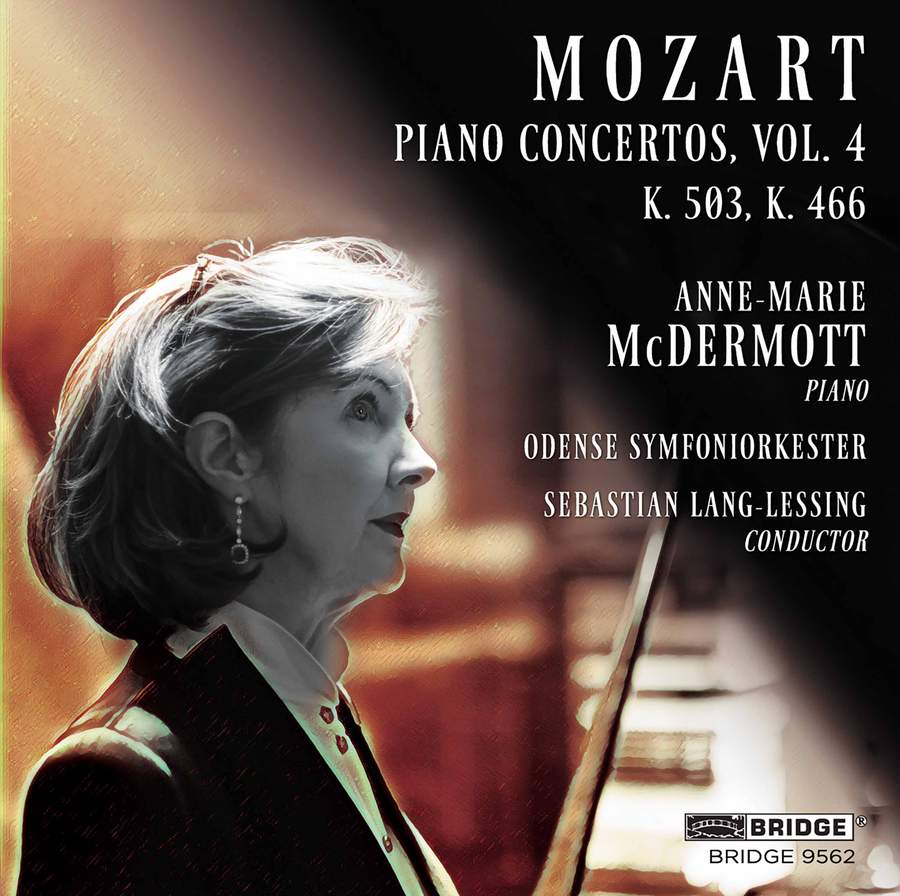MOZART Piano Concertos, Vol 4 - K503; K466 (Anne Marie McDermott)
View record and artist detailsRecord and Artist Details
Genre:
Orchestral
Label: Bridge
Magazine Review Date: 06/2022
Media Format: CD or Download
Media Runtime: 66
Mastering:
DDD
Catalogue Number: BRIDGE9562

Tracks:
| Composition | Artist Credit |
|---|---|
| Concerto for Piano and Orchestra No. 25 |
Wolfgang Amadeus Mozart, Composer
Anne-Marie McDermott, Piano Odense Symphony Orchestra Sebastian Lang-Lessing, Conductor |
| Concerto for Piano and Orchestra No. 20 |
Wolfgang Amadeus Mozart, Composer
Anne-Marie McDermott, Piano Odense Symphony Orchestra Sebastian Lang-Lessing, Conductor |
Author: David Threasher
Anne-Marie McDermott reaches the fourth volume of her Mozart cycle with various conductors, offering the same concerto coupling as Jeremy Denk and Martha Argerich (with Claudio Abbado). The listener is struck, at the outset of the grand C major Concerto, K503, by the transparency and attentive balance of the orchestral introduction, enhanced by fine engineering (in Odense’s Carl Nielsen Hall), and by McDermott’s dapper response to the solo part. As the Allegro maestoso proceeds, however, the effect becomes increasingly episodic – hardly the fault of McDermott’s high degree of rhythmic accuracy, differentiating explicitly between semiquavers and sextuplets, duplets and triplets; more to do with the minute pauses that delineate phrases and paragraphs, arresting the forward flow of the music and weakening the sense of spontaneity so evident in other recordings.
No cadenza by Mozart exists for either concerto. In the opening movement of K503, McDermott plays one by the Curtis Institute academic Chris Rogerson – suitably majestic and ingenious in its thematic deployment but way too long, inflating the movement to an enervating 17 minutes (as opposed to Argerich’s 14'18" or Denk’s 14'47"). The triple-time Andante is taken with a palpable six-beat tread (eight minutes compared with Argerich’s seven); and a curiously joyless final Allegretto (with some uncharacteristic misreadings at 2'54", 3'58", 5'44" and 7'36") had me leafing through the score to see how many pages were left. That shouldn’t happen in Mozart.
Then compare McDermott’s D minor Concerto, K466, with Leif Ove Andsnes’s recent recording, a Recording of the Month last year. Everything is acutely judged, precisely placed and smartly dispatched by McDermott and her Odense accompanists but, once again, the sense is of each challenge met, completed and ticked off before the next is addressed. Andsnes’s Allegro unfolds more like a chemical chain reaction, each event, each moment the inevitable consequence of the last, the performance’s seething surface the irresistible result of the volatile activity beneath. McDermott seems happiest in the Romance, eloquently singing its cantilena; but come the central convulsion and again her care for correctness stills the music’s potency, with the accompaniment, as elsewhere, somewhat under-characterised. The familiar Beethoven cadenzas are played, the piano sound is appealing and the annotations are comprehensive. But there are many other recordings that bring these cherished concertos more fully to life.
Discover the world's largest classical music catalogue with Presto Music.

Gramophone Digital Club
- Digital Edition
- Digital Archive
- Reviews Database
- Full website access
From £8.75 / month
Subscribe
Gramophone Full Club
- Print Edition
- Digital Edition
- Digital Archive
- Reviews Database
- Full website access
From £11.00 / month
Subscribe
If you are a library, university or other organisation that would be interested in an institutional subscription to Gramophone please click here for further information.




